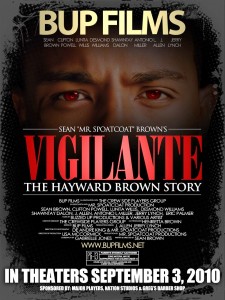 Tax Supported Michigan Film Productions
Tax Supported Michigan Film Productions
by David Rambeau
On Saturday, April 30, 2011 Project BAIT, Friends of BAIT and the Urban Theater Magazine are planning to produce a seminar titled, “Making Movies in Michigan, Producing Plays at the Dwyer Cultural Center ) in New York.” (http://www.dwyercc.org/(http://www.dwyercc.org/). This is our humble attempt to generate a Detroit-New York connection from an afro-centric perspective in the areas of film and theater.
We get a regular array of black plays from out-of-town produced in theater venues in Detroit. I don’t recall any Detroit theater productions that has made it to New York. To alter that routine we’re holding our seminar so Detroit’s producers, directors, writers, actors and technicians can learn something about producing theater in Harlem.
Fortunately,Woodie King, Jr., director of the New Federal Theatre (see NFT website at http://www.newfederaltheatre.org/) has agreed to be one of our panelists.
In addition we want to entice some of New York’s black film producers to consider making movies in Michigan to take advantage of the tax break the state is offering.
U. S. economists are predicting no employment gains for 2011, so whatever new jobs in Michigan and Detroit or other urban areas where substantial numbers of blacks live, must be generated from new business opportunities. Given our interest in cultural expression of all kinds and our disproportionate attendance at movie theaters and television watching, (see Target Market News, “The Black Consumer Market Authority,” at http://www.targetmarketnews.com/ ), we need to be producing, with state support, more movies and plays by us, for us.
With the relatively new 42% tax credit there has been an explosion of films produced in Michigan. The tax break was passed by the Michigan State Legislature, composed of state representatives and state senators, which include a number of black elected officials. Now the time has come, it’s overdue really, for research of the production statistics in detail, to critically analyze the costs and the benefits for Michigan’s black taxpayers.
Fourteen percent of Michigan’s residents are black, but are we getting 14% of the tax supported pie? Data should be available from the Michigan Film Office (see their website) and the Detroit Film Office (see their website), but it isn’t. (ed. note: an inquiry to Sommer Woods, head of the Detroit film office, regarding such statistics was made by the Voice of Detroit several months ago, but never answered.)

Transformers 3, by Stephen Spielberg and Paramount Pictures, was partly shot in downtown Detroit; when will Black politicians TRANSFORM tax opportunities for BLACK FILMMAKERS
Michigan’s new governor says he’s going to review the tax credit. Will the black state reps and state senators review the benefits accrued by their constituents? Will Michigan’s black mayors and city council people do any diligence regarding black film activity in this state? I talked recently to a black employee in a state rep’s office who told me blacks get crumbs as far as employment is concerned, that no films produced by blacks have received the tax support, and that black businesses obtain sparse benefits. So much for affirmative action.
Three aspects or tools of cultural analysis are class, race and gender. Using these as part of the process of comparative analysis is scientifically valid to use to ascertain and evaluate the flow of financial and social benefits in a society.
I’m not, at this point, talking about classism, racism, or sexism. I’m talking about research and analysis, and using that research to shape social policy on a distributive basis. I’m sure elected officials understand what I’m talking about since this is the year when legislative districts are “right-sized” based on the 2010 census. I’m talking about “right-sizing” with regard to the distribution of the 42% tax credit.
Currently there’s a $50,000 floor for acquisition of the tax break that acts as a significant barrier for black movie production, much like performance bonds act as a barrier for black construction contractors. Blacks make short, inexpensive films, below the $50K threshold, which are shown on local cable stations and in film festivals rather than in commercial distribution to theater complexes located in shopping malls.
We have small, innovative, independent, black producers like the Trinity Film Coalition, http://www.trinityfilmcoalition.com, headed by Marshalle Montgomery, trying to gain access to success in the film industry. That is difficult enough without the state putting up tax and financial obstacles to entry.
Meanwhile in Detroit, the locally produced film “Vigilante” was the victim of severe police harassment and bureaucratic incompetence. The only benefit was the unintended publicity the movie received. (See http://www.bupfilms.net/, and read Police threaten to kill Detroit crew filming the story of Hayward Brown)
So there’s a lot for us to discuss in the film and theater seminar we’re planning for Saturday, April 30, 2011, at the Dwyer Cultural Center in Harlem, New York.
Perhaps you have an experience, research or data to submit to us for inclusion in the seminar. Or you might want to attend this venture to enhance your contacts, knowledge and production possibilities in the theater and film business. If so, contact Project BAIT 313-871-3333 or this publication.
References: Recommended Reading:
Making Movie Course, by Chris Patmore, Barron’s Publishing
DPL #791.43023 P274m
So You Want To Be A Playwright, by Tim Fountain, Nick Hern Books
DPL # 808.2F825s
Shadow and Act – Black Film website at http://www.shadowandact.com/
 David Rambeau is the producer/host of Project BAIT’s television production, For My People, which airs on Ch. 50 WKBD-TV at 6:30 a.m. on Saturday mornings, and on youtube.com/projectbaitdet. He is also the publisher of the Urban Theater Magazine and is editor of the website http://www.projectbait.blakgold.net.
David Rambeau is the producer/host of Project BAIT’s television production, For My People, which airs on Ch. 50 WKBD-TV at 6:30 a.m. on Saturday mornings, and on youtube.com/projectbaitdet. He is also the publisher of the Urban Theater Magazine and is editor of the website http://www.projectbait.blakgold.net.







